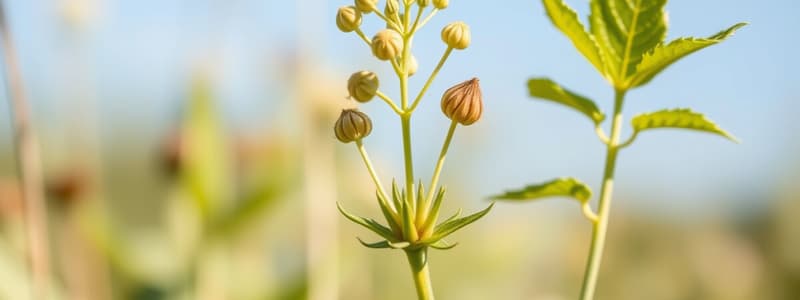Podcast
Questions and Answers
What is the main focus of economic botany?
What is the main focus of economic botany?
- The study of plant disease
- The study of plant utilization by humans (correct)
- The study of plants in relation to time through fossils
- The manipulation of genes between plant species
Which branch of botany specifically studies ferns?
Which branch of botany specifically studies ferns?
- Bryology
- Mycology
- Pteridology (correct)
- Phycology
What does palynology focus on?
What does palynology focus on?
- The study of plant diseases
- The study of fungi
- The study of pollen and spores (correct)
- The study of water plants
Which branch of specialized botany deals with algae?
Which branch of specialized botany deals with algae?
Why is studying botany important to human survival?
Why is studying botany important to human survival?
Who wrote Inquiry into Plants and is considered a significant figure in plant science?
Who wrote Inquiry into Plants and is considered a significant figure in plant science?
What was a key achievement of the medieval period in plant science?
What was a key achievement of the medieval period in plant science?
Which botanist proposed a sexual system of plant classification?
Which botanist proposed a sexual system of plant classification?
What belief did herbalists hold during the medieval period regarding plants?
What belief did herbalists hold during the medieval period regarding plants?
In which period did modern botanical study begin to gain rapid advancement?
In which period did modern botanical study begin to gain rapid advancement?
Which of the following is NOT a work attributed to Dioscorides?
Which of the following is NOT a work attributed to Dioscorides?
What did John Ray contribute to the field of plant science?
What did John Ray contribute to the field of plant science?
Which of the following statements about the early period of plant science is true?
Which of the following statements about the early period of plant science is true?
What does basic botany primarily focus on?
What does basic botany primarily focus on?
Which branch of botany studies the external and internal structures of plants?
Which branch of botany studies the external and internal structures of plants?
Who initiated significant work in Indo-Malayan botany in the Philippines?
Who initiated significant work in Indo-Malayan botany in the Philippines?
Which aspect of plant study does Plant Systematics involve?
Which aspect of plant study does Plant Systematics involve?
What is the main focus of Plant Physiology?
What is the main focus of Plant Physiology?
What does Plant Ecology study?
What does Plant Ecology study?
Which botanist started the first herbarium at the University of the Philippines?
Which botanist started the first herbarium at the University of the Philippines?
Which of the following is NOT a focus of basic botany?
Which of the following is NOT a focus of basic botany?
What is the primary function of plants in the ecosystem?
What is the primary function of plants in the ecosystem?
Which of the following statements best describes botany?
Which of the following statements best describes botany?
Which of the following is NOT a necessity for human life mentioned?
Which of the following is NOT a necessity for human life mentioned?
What is the first step in the scientific method as described?
What is the first step in the scientific method as described?
Which of the following best describes the importance of photosynthesis?
Which of the following best describes the importance of photosynthesis?
Why is modern society considered estranged from the natural world?
Why is modern society considered estranged from the natural world?
What do the steps in the scientific method largely rely on?
What do the steps in the scientific method largely rely on?
What keeps the farmer's work cycle in sync?
What keeps the farmer's work cycle in sync?
Which scientist is credited with the formulation of cell theory?
Which scientist is credited with the formulation of cell theory?
What important contribution did Robert Hooke make to plant anatomy?
What important contribution did Robert Hooke make to plant anatomy?
Which of the following correctly describes the work of Zacharias Jansen?
Which of the following correctly describes the work of Zacharias Jansen?
Which of the following statements about Charles Darwin is true?
Which of the following statements about Charles Darwin is true?
Which contribution is associated with Gregor Johann Mendel?
Which contribution is associated with Gregor Johann Mendel?
What conclusion did J.B. Von Helmont reach regarding plant growth?
What conclusion did J.B. Von Helmont reach regarding plant growth?
Stephen Hales is best known for his contributions to which field?
Stephen Hales is best known for his contributions to which field?
What was the significance of physical sciences in relation to modern botany?
What was the significance of physical sciences in relation to modern botany?
Flashcards are hidden until you start studying
Study Notes
Early Period
- Plant science origins trace back to ancient Greek philosophers, particularly Aristotle, who explored the nature of plants.
- Theophrastus, Aristotle's disciple, authored Inquiry into Plants and History of Plants, laying groundwork for botanical studies.
- Dioscorides wrote Materia Medica, detailing medicinal plants and influencing pharmacology.
- Pliny the Elder compiled nearly a thousand plant species in Natural History, serving as a significant botanical reference for centuries.
Medieval Period
- Marked by stagnation in European scientific exploration until the 16th century.
- Renewed interest led to the Herbals movement (1500-1700), focusing on plants’ medicinal properties.
- Key figures included Leonhard Fuchs, Hieronymus Bock, and Otto Brunfels, recognized as founders of modern botany despite primitive scientific methods.
- The Doctrine of Signatures suggested that plants had signs indicating their medicinal uses.
- Establishment of herbaria and the creation of Botanical Gardens began, with the first gardens in Pisa and Padua.
Modern Period
- Late 17th century marked the beginning of modern botanical studies with significant advancements in the 19th and early 20th centuries.
- Early botanical works primarily emphasized taxonomy; John Ray initiated modern classification systems.
- Carolus Linnaeus developed a sexual system of classification but was not based on natural relationships, yet it was a major advancement.
Importance of Plants
- Plants are essential for human survival, providing food, medicine, and ecosystem balance.
- Modern urban lifestyles often disconnect individuals from nature, contrasting with rural and hunter-gatherer cultures that rely on plants for sustenance.
- Botany is critical for understanding food production, oxygen generation through photosynthesis, and overall environmental health.
Definitions
- Botany: The scientific study of plants, encompassing form, structure, function, reproduction, and utilization.
- Science: A systematic body of knowledge derived from experimentation and observation, leading to further inquiry.
Specialized and Applied Botany
- Specialized Botany: Focused on specific plant types, such as Phycology (algae), Mycology (fungi), and Bryology (mosses).
- Applied Botany: Practical utilization of plant studies, including Ethnobotany (use by indigenous people) and Economic Botany (plant usage by humans).
Reasons for Studying Botany
- Plants are vital for food, clothing, energy, and medicine; they also contribute to beauty and luxury items.
- Studying plants fosters an appreciation for nature and enhances educational experiences.
Botanical Contributions in the Philippines
- The Spanish government encouraged botanical studies, fostering works by Spanish bureaus of Forestry in the Philippines.
- Notable botanists contributed significantly to the field, rectifying and enhancing previous classifications and knowledge.
Development of Plant Sciences
- A.L. de Jussieu and A.P. de Candolle established phylogenetic classification systems.
- Zacharias Jansen improved the magnifying lens, aiding plant tissue studies.
- Robert Hooke's discovery of plant cells marked the beginning of cytology.
- Key experiments by Camerarius evidenced the sexual nature of plants leading to fertilization.
- The Cell Theory was formulated by Schleiden and Schwann, defining the cell as the fundamental unit of life.
- Darwin’s Origin of Species highlighted evolutionary development of plants, fueling genetic studies.
- Gregor Mendel's laws of inheritance laid the foundation for genetics.
- J.B. Von Helmont's experiment established a relationship between plant mass and water.
- Stephen Hales conducted pioneering work in plant physiology regarding food manufacture and material transportation within plants.
Studying That Suits You
Use AI to generate personalized quizzes and flashcards to suit your learning preferences.




